2022 Swedish election
For Members
INTERVIEW: 'We can't be focused on the environment as a niche issue'
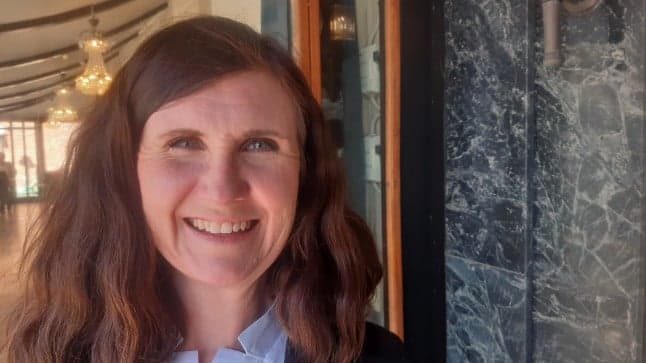
In the first of The Local's party leader interviews ahead of the election, Märta Stenevi tells us why she is trying to give the Swedish Green Party a broader focus than just climate and environment.
Märta Stenevi looks out over Malmö's main central square and regrets the number of cars. In her two and a half years as the city's Urban Planning chief, she says, she pushed to pedestrianise it, but never overcame resistance from the local shops.
For the joint leader of Sweden's Green Party, Malmö is still very much home.
When we meet at the city's Scandic Hotel, she has just dropped her children off at their school, and afterwards, she'll go straight to another school, in the troubled Rosengård district, to see the damage done during the Easter riots.
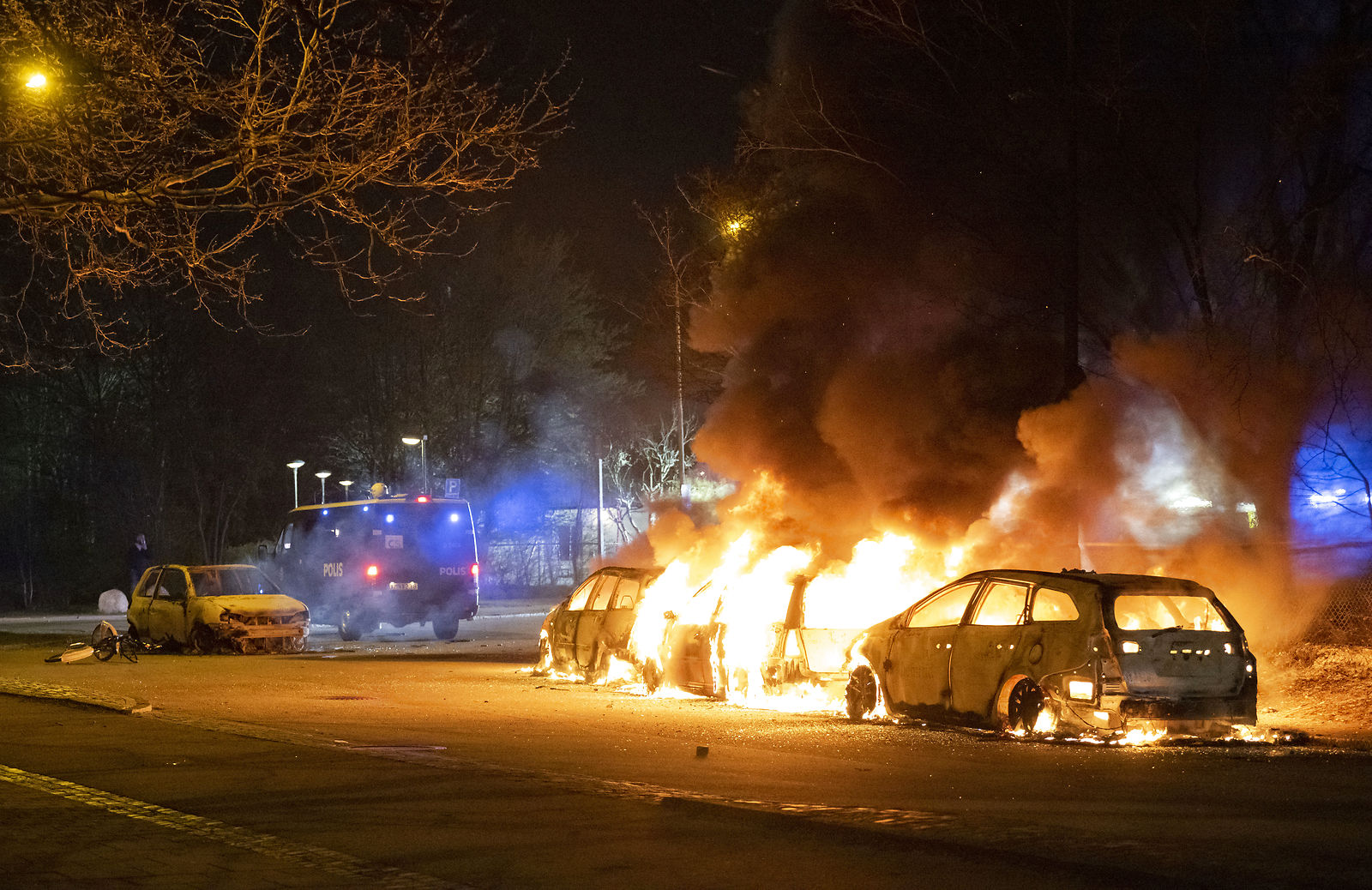
Cars on fire in Rosengård, Malmö on Sunday night. The police went to the scene with a large number of vehicles and fired tear gas to disperse crowds. Photo: Johan Nilsson / TT / Ritzau Scanpix
"It's not ethnic differences"
For her, the extreme violence of the previous weekend isn't about religion or ethnicity, but about class.
"If you have big chasms between the rich people and poor people in a country, you will also have a social upheaval and social disturbance. This is well-documented all across the world," she says.
"What we have done for the past three decades in Sweden is to create a wider and wider gap between those who have a lot and those who have nothing."
So the solution lies not in new hate laws or tougher policing, but in doing what Sweden did to end its extreme inequality at the start of the 20th century, when it created the socialist folkhem, or "people's home".
"It's easy to forget that 100 to 150 years ago, Sweden was a developing country, with a huge class of poor people with no education whatsoever. And we did this huge lift of a whole nation. And we can do this again," she says. "But it needs resources, it needs political will."
The worst way of reacting to the riots, she argues, is that of Sweden's right-wing parties, which she says is "ridiculous".
"You cannot do it by punishment, by adding to the sense of outsider status, you have to start working on actually including people, and that happens through old-fashioned things such as education, and a proper minimum income, to lift people out of their poverty, not to keep them there."
Greens should not be a single-issue party
If these are arguments you might expect to come from an old-school Social Democrat or Left Party politician, that shouldn't come as a surprise.
If Stenevi has a mission as co-leader of Sweden's Green Party, it's to broaden the span of its policies beyond climate and environment. Not that she is critical of her climate-focused predecessor Isabella Lövin, who she argues has "done more for climate politics in Europe than any other politician", with a legacy that is "quite astonishing".
But she is convinced that if the Green Party is to stay above the four percent support it needs to stay in parliament, it needs to have policies across the board.
"If we're satisfied by just driving one political issue, and only talking about climate and environmental issues, then we put the voters in a position where they need to choose between wanting to vote for fixing climate change, or for better schools, or for better healthcare or for a more just society," she argues. "And that is not a very fair choice to ask the voters to make."
She points to the example of Norway's Green Party, which focused its campaign in last year's election narrowly on ending oil exploration. The party, she says, "crashed pretty hard... because they were too focused on one single issue."
"I think we need to move away from talking about environmental issues as sort of a niche interest, and rather talk about what kind of society we are looking for."
The Greens made it above the four percent threshold needed to retain their seats in parliament after September's election in a poll released on Tuesday night.
But its supporters still risk seeing their votes go to waste if the party slips below four percent on election day, losing the leftwing bloc a chunk of the votes necessary to prevent a right-wing government from taking power dependent on the far-Right Sweden Democrats.
She dismisses this scenario, saying she is "absolutely confident" that the party will make it back into parliament.
"It's actually quite the other way around. If you want to make sure that we don't have a right-wing government then you absolutely need to vote Green because we have been keeping them at arm's length at every point during our 30 to 40 years in politics," she says.
 Bonava, a construction company, building a new development at Kristinebergs slottspark in central Stockholm, back in 2019. Photo: Tomas Oneborg/SvD/TT
It seems the party still has some way to go in developing a full policy portfolio, though. When the Local asked her about two issues that affect foreigners, problems with work permits, and difficulty getting housing, she had few concrete policies to offer.
She said the work permit issue was a symptom of a broader issue with parties rushing to tighten immigration laws without thinking through all of the consequences. On problems finding a place to live, she said the solution was threefold, "building more housing, and doing that in a good, sustainable way, phasing out rent deductions slowly, and increasing the bostadsbidrag" (housing benefit).
Nato
Arguably, the party's recent rise above the parliamentary threshold has come because of its dogged opposition to joining Nato.
"When we look at the horrendous war that Russia has inflicted on Ukraine, it's become very obvious that we have a whole new situation in Europe and that, that also needs to be considered very deeply," Stenevi says.
But the answer, she says, is not becoming a member of the alliance.
"We would like to see other solutions for Sweden than an actual membership, a closer cooperation with Nato, but not a full membership," she says. "Our party does not want Sweden to be a member of Nato, and we stand quite firmly in that."
Bonava, a construction company, building a new development at Kristinebergs slottspark in central Stockholm, back in 2019. Photo: Tomas Oneborg/SvD/TT
It seems the party still has some way to go in developing a full policy portfolio, though. When the Local asked her about two issues that affect foreigners, problems with work permits, and difficulty getting housing, she had few concrete policies to offer.
She said the work permit issue was a symptom of a broader issue with parties rushing to tighten immigration laws without thinking through all of the consequences. On problems finding a place to live, she said the solution was threefold, "building more housing, and doing that in a good, sustainable way, phasing out rent deductions slowly, and increasing the bostadsbidrag" (housing benefit).
Nato
Arguably, the party's recent rise above the parliamentary threshold has come because of its dogged opposition to joining Nato.
"When we look at the horrendous war that Russia has inflicted on Ukraine, it's become very obvious that we have a whole new situation in Europe and that, that also needs to be considered very deeply," Stenevi says.
But the answer, she says, is not becoming a member of the alliance.
"We would like to see other solutions for Sweden than an actual membership, a closer cooperation with Nato, but not a full membership," she says. "Our party does not want Sweden to be a member of Nato, and we stand quite firmly in that."
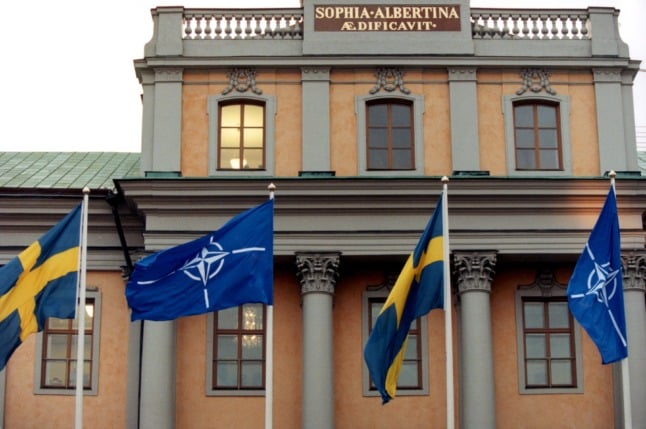 File photo of Swedish and Nato flags outside the Swedish foreign ministry in 1996. Photo: Ingvar Karmhed/SCANPIX/TT
Energy
At last year's UN Climate Change Conference in Glasgow, the world's nations pledged to phase out subsidies for fossil fuels.
But when electricity and pump prices started to soar only months later, the Social Democrats joined a pre-election bidding war with the right-wing parties over who would do the most to subsidise petrol and diesel prices.
READ ALSO:
File photo of Swedish and Nato flags outside the Swedish foreign ministry in 1996. Photo: Ingvar Karmhed/SCANPIX/TT
Energy
At last year's UN Climate Change Conference in Glasgow, the world's nations pledged to phase out subsidies for fossil fuels.
But when electricity and pump prices started to soar only months later, the Social Democrats joined a pre-election bidding war with the right-wing parties over who would do the most to subsidise petrol and diesel prices.
READ ALSO:
- Everything you need to know about Sweden's fuel bonus
- Sweden’s rising prices and what’s being done to stop them
- Sweden’s electricity rebate: Here’s how much cash you’ll get back on your bills
For Stenevi, this is evidence of just how addicted Western societies are to fossil fuels.
"The past few months have really shown how toxic these dependencies are," she says. "When we look at the possibility to sanction Russia for invading Ukraine, there is a hesitation to deal the actual hardest blow that we could to the Russian regime because we are so dependent on fossil energy from Russia."
The subsidies, she says, are "absolutely ridiculous", as they will deepen this dependency, rather than speeding the shift to renewables.
"It's been really sad to see, because increasing the climate crisis and increasing emissions will definitely not be the path towards a secure Europe or to independence from these villain states that provide us with oil."
She also accuses Sweden's right-wing parties of making "ridiculous" claims about nuclear power, when Sweden should be investing in offshore wind-based power.
"If we were to just put that on hold, as the Moderate Party wants, and wait for nuclear power, then it will be both way too expensive and way too slow, not to get into the discussion of the risks that exist."
The victims, she says, will be the companies and businesses the Moderates claim to represent.
Where the right-wing parties have been successful, she concedes, is in turning the debate about energy and the climate into a binary question of "nuclear or not nuclear".
"We have a big job to actually politicise the debate regarding the climate crisis, and not let it just relapse into nuclear power," she says.
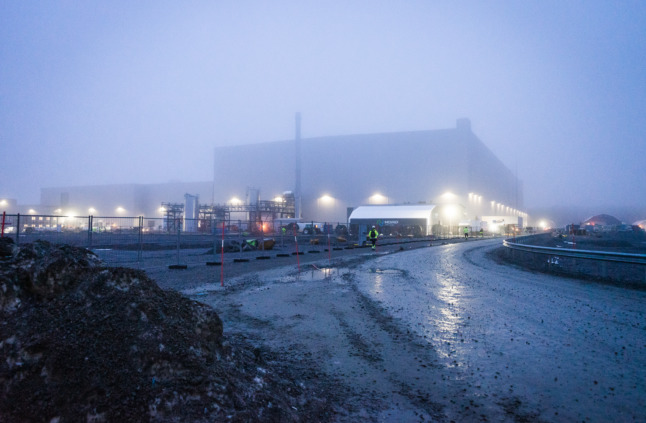 Northvolt's battery factory in Skellefteå, northern Sweden. One of many large infrastructural projects built with the help of posted workers.
Northvolt's battery factory in Skellefteå, northern Sweden. One of many large infrastructural projects built with the help of posted workers.
Photo: Axel Hilleskog/SvD/TT
The Green Party's record in government
As the party goes into the election, some argue that it is suffering because it has never done enough to communicate the green policies it drove through while in government.
Stenevi cites the mandate to mix biofuels into petrol and diesel, the green industrialisation of the North, the expansion of renewable energy, and the shift in the transport sector to electric cars as some of the party's achievements.
"All of these things were a hard fight every step of the way, we have had to push them [the Social Democrats] very, very hard to get things in place quickly enough and massively enough, and we still need to do so much more," she says.
The government's spring budget, the first without the green party in government, saw environmental spending fall.
"What we see now is that as soon as we leave the government.. as soon as we're not there to push that agenda, it falls back."
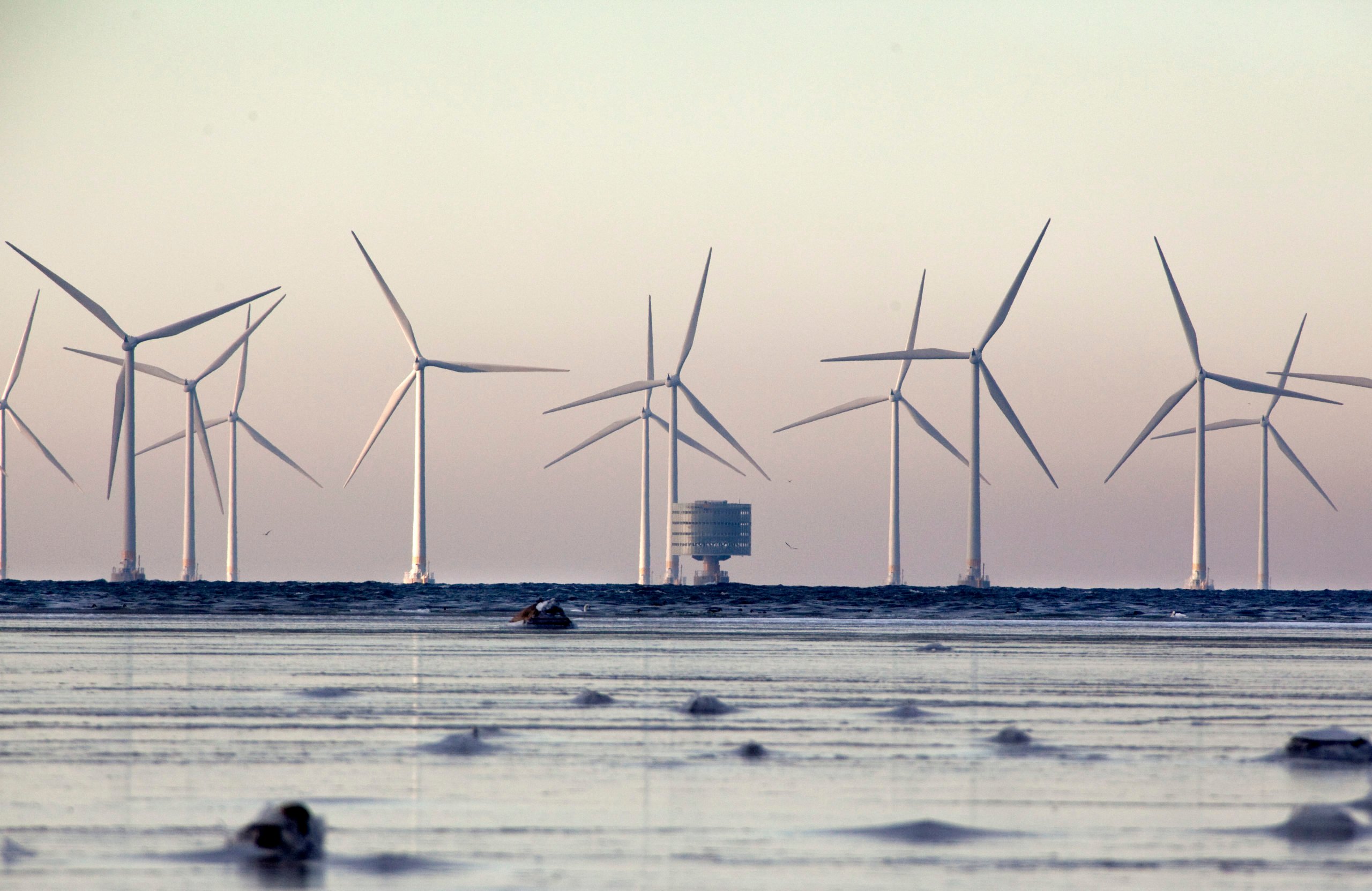 Lillgrund, the Swedish offshore windpark in the Öresund strait, south of Malmö. Photo: Stig-Åke Jönsson/Scanpix/TT
The election
The recent elections in Denmark in 2019, and Germany and Norway in 2021, have all been seen as "climate elections", with the climate crisis a top issue.
But as the campaign for Sweden's election on September 11th begins to pick up pace, there's been little to no debate on how to speed up national emissions reductions.
"That is of course a huge task for me and for Per Bolund [the Greens' other leader] to do ahead of the election. But that goes without saying. That's sort of the job that we have to do."
Listen to Märta Stenevi discussing energy in the April 30th 2022 edition of Sweden in Focus, The Local's podcast.
Click HERE to listen to Sweden in Focus on Apple Podcasts, Spotify or Google Podcasts.
Lillgrund, the Swedish offshore windpark in the Öresund strait, south of Malmö. Photo: Stig-Åke Jönsson/Scanpix/TT
The election
The recent elections in Denmark in 2019, and Germany and Norway in 2021, have all been seen as "climate elections", with the climate crisis a top issue.
But as the campaign for Sweden's election on September 11th begins to pick up pace, there's been little to no debate on how to speed up national emissions reductions.
"That is of course a huge task for me and for Per Bolund [the Greens' other leader] to do ahead of the election. But that goes without saying. That's sort of the job that we have to do."
Listen to Märta Stenevi discussing energy in the April 30th 2022 edition of Sweden in Focus, The Local's podcast.
Click HERE to listen to Sweden in Focus on Apple Podcasts, Spotify or Google Podcasts.
Comments
See Also
Märta Stenevi looks out over Malmö's main central square and regrets the number of cars. In her two and a half years as the city's Urban Planning chief, she says, she pushed to pedestrianise it, but never overcame resistance from the local shops.
For the joint leader of Sweden's Green Party, Malmö is still very much home.
When we meet at the city's Scandic Hotel, she has just dropped her children off at their school, and afterwards, she'll go straight to another school, in the troubled Rosengård district, to see the damage done during the Easter riots.

Cars on fire in Rosengård, Malmö on Sunday night. The police went to the scene with a large number of vehicles and fired tear gas to disperse crowds. Photo: Johan Nilsson / TT / Ritzau Scanpix
"It's not ethnic differences"
For her, the extreme violence of the previous weekend isn't about religion or ethnicity, but about class.
"If you have big chasms between the rich people and poor people in a country, you will also have a social upheaval and social disturbance. This is well-documented all across the world," she says.
"What we have done for the past three decades in Sweden is to create a wider and wider gap between those who have a lot and those who have nothing."
So the solution lies not in new hate laws or tougher policing, but in doing what Sweden did to end its extreme inequality at the start of the 20th century, when it created the socialist folkhem, or "people's home".
"It's easy to forget that 100 to 150 years ago, Sweden was a developing country, with a huge class of poor people with no education whatsoever. And we did this huge lift of a whole nation. And we can do this again," she says. "But it needs resources, it needs political will."
The worst way of reacting to the riots, she argues, is that of Sweden's right-wing parties, which she says is "ridiculous".
"You cannot do it by punishment, by adding to the sense of outsider status, you have to start working on actually including people, and that happens through old-fashioned things such as education, and a proper minimum income, to lift people out of their poverty, not to keep them there."
Greens should not be a single-issue party
If these are arguments you might expect to come from an old-school Social Democrat or Left Party politician, that shouldn't come as a surprise.
If Stenevi has a mission as co-leader of Sweden's Green Party, it's to broaden the span of its policies beyond climate and environment. Not that she is critical of her climate-focused predecessor Isabella Lövin, who she argues has "done more for climate politics in Europe than any other politician", with a legacy that is "quite astonishing".
But she is convinced that if the Green Party is to stay above the four percent support it needs to stay in parliament, it needs to have policies across the board.
"If we're satisfied by just driving one political issue, and only talking about climate and environmental issues, then we put the voters in a position where they need to choose between wanting to vote for fixing climate change, or for better schools, or for better healthcare or for a more just society," she argues. "And that is not a very fair choice to ask the voters to make."
She points to the example of Norway's Green Party, which focused its campaign in last year's election narrowly on ending oil exploration. The party, she says, "crashed pretty hard... because they were too focused on one single issue."
"I think we need to move away from talking about environmental issues as sort of a niche interest, and rather talk about what kind of society we are looking for."
The Greens made it above the four percent threshold needed to retain their seats in parliament after September's election in a poll released on Tuesday night.
But its supporters still risk seeing their votes go to waste if the party slips below four percent on election day, losing the leftwing bloc a chunk of the votes necessary to prevent a right-wing government from taking power dependent on the far-Right Sweden Democrats.
She dismisses this scenario, saying she is "absolutely confident" that the party will make it back into parliament.
"It's actually quite the other way around. If you want to make sure that we don't have a right-wing government then you absolutely need to vote Green because we have been keeping them at arm's length at every point during our 30 to 40 years in politics," she says.

Bonava, a construction company, building a new development at Kristinebergs slottspark in central Stockholm, back in 2019. Photo: Tomas Oneborg/SvD/TT
It seems the party still has some way to go in developing a full policy portfolio, though. When the Local asked her about two issues that affect foreigners, problems with work permits, and difficulty getting housing, she had few concrete policies to offer.
She said the work permit issue was a symptom of a broader issue with parties rushing to tighten immigration laws without thinking through all of the consequences. On problems finding a place to live, she said the solution was threefold, "building more housing, and doing that in a good, sustainable way, phasing out rent deductions slowly, and increasing the bostadsbidrag" (housing benefit).
Nato
Arguably, the party's recent rise above the parliamentary threshold has come because of its dogged opposition to joining Nato.
"When we look at the horrendous war that Russia has inflicted on Ukraine, it's become very obvious that we have a whole new situation in Europe and that, that also needs to be considered very deeply," Stenevi says.
But the answer, she says, is not becoming a member of the alliance.
"We would like to see other solutions for Sweden than an actual membership, a closer cooperation with Nato, but not a full membership," she says. "Our party does not want Sweden to be a member of Nato, and we stand quite firmly in that."

File photo of Swedish and Nato flags outside the Swedish foreign ministry in 1996. Photo: Ingvar Karmhed/SCANPIX/TT
Energy
At last year's UN Climate Change Conference in Glasgow, the world's nations pledged to phase out subsidies for fossil fuels.
But when electricity and pump prices started to soar only months later, the Social Democrats joined a pre-election bidding war with the right-wing parties over who would do the most to subsidise petrol and diesel prices.
READ ALSO:
- Everything you need to know about Sweden's fuel bonus
- Sweden’s rising prices and what’s being done to stop them
- Sweden’s electricity rebate: Here’s how much cash you’ll get back on your bills
For Stenevi, this is evidence of just how addicted Western societies are to fossil fuels.
"The past few months have really shown how toxic these dependencies are," she says. "When we look at the possibility to sanction Russia for invading Ukraine, there is a hesitation to deal the actual hardest blow that we could to the Russian regime because we are so dependent on fossil energy from Russia."
The subsidies, she says, are "absolutely ridiculous", as they will deepen this dependency, rather than speeding the shift to renewables.
"It's been really sad to see, because increasing the climate crisis and increasing emissions will definitely not be the path towards a secure Europe or to independence from these villain states that provide us with oil."
She also accuses Sweden's right-wing parties of making "ridiculous" claims about nuclear power, when Sweden should be investing in offshore wind-based power.
"If we were to just put that on hold, as the Moderate Party wants, and wait for nuclear power, then it will be both way too expensive and way too slow, not to get into the discussion of the risks that exist."
The victims, she says, will be the companies and businesses the Moderates claim to represent.
Where the right-wing parties have been successful, she concedes, is in turning the debate about energy and the climate into a binary question of "nuclear or not nuclear".
"We have a big job to actually politicise the debate regarding the climate crisis, and not let it just relapse into nuclear power," she says.

Northvolt's battery factory in Skellefteå, northern Sweden. One of many large infrastructural projects built with the help of posted workers.
Photo: Axel Hilleskog/SvD/TT
Photo: Axel Hilleskog/SvD/TT
The Green Party's record in government
As the party goes into the election, some argue that it is suffering because it has never done enough to communicate the green policies it drove through while in government.
Stenevi cites the mandate to mix biofuels into petrol and diesel, the green industrialisation of the North, the expansion of renewable energy, and the shift in the transport sector to electric cars as some of the party's achievements.
"All of these things were a hard fight every step of the way, we have had to push them [the Social Democrats] very, very hard to get things in place quickly enough and massively enough, and we still need to do so much more," she says.
The government's spring budget, the first without the green party in government, saw environmental spending fall.
"What we see now is that as soon as we leave the government.. as soon as we're not there to push that agenda, it falls back."

Lillgrund, the Swedish offshore windpark in the Öresund strait, south of Malmö. Photo: Stig-Åke Jönsson/Scanpix/TT
The election
The recent elections in Denmark in 2019, and Germany and Norway in 2021, have all been seen as "climate elections", with the climate crisis a top issue.
But as the campaign for Sweden's election on September 11th begins to pick up pace, there's been little to no debate on how to speed up national emissions reductions.
"That is of course a huge task for me and for Per Bolund [the Greens' other leader] to do ahead of the election. But that goes without saying. That's sort of the job that we have to do."
Listen to Märta Stenevi discussing energy in the April 30th 2022 edition of Sweden in Focus, The Local's podcast.
Click HERE to listen to Sweden in Focus on Apple Podcasts, Spotify or Google Podcasts.
Join the conversation in our comments section below. Share your own views and experience and if you have a question or suggestion for our journalists then email us at [email protected].
Please keep comments civil, constructive and on topic – and make sure to read our terms of use before getting involved.
Please log in here to leave a comment.